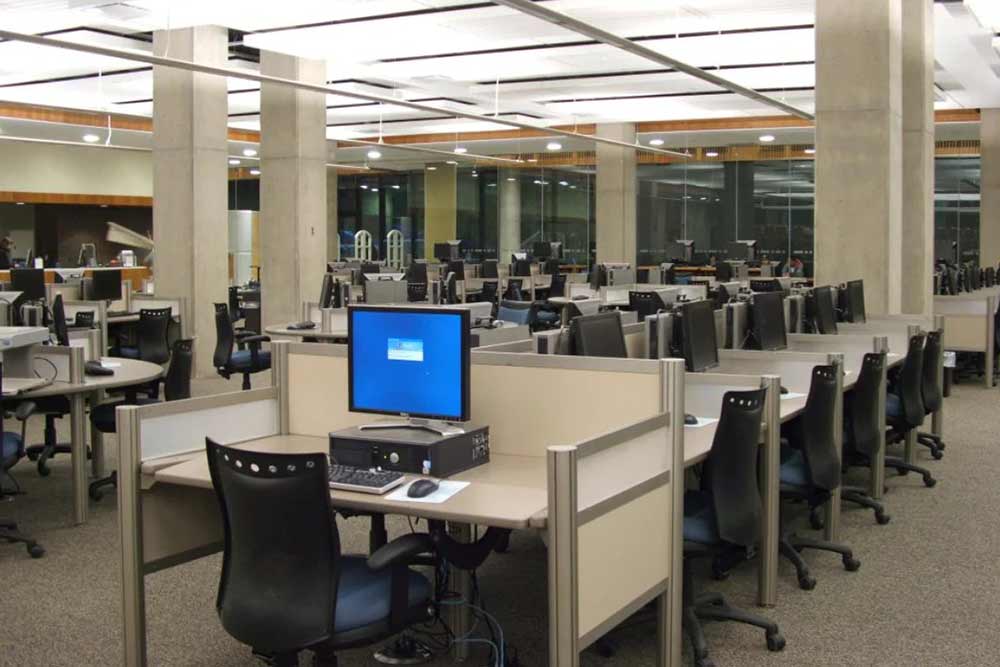The name conjures up odd images of desks corralled in a hotel lounge somewhere, just waiting to migrate to another venue. However, desk hoteling is quite a different thing altogether, and it helps to understand the meaning of the phrase, especially if you own a business.
In short, desk hoteling is a lot like hot-desking, which involves the deployment of various desks and workstations for use by many different employees at once. The two are similar, with some slight differences. Desk hoteling involves compartmentalizing the right resources into various areas of the workplace, then allocating time slots for employees to use those areas.
Think of it as “workplace time-sharing,” similar to how two individuals may stay in a single cottage at two different times of the year. The illustration works here as well.
WHY USE DESK HOTELING?
These days, workplace space management is a real concern. Many companies are downsizing to avoid paying tremendous rental costs, while others have switched to a hybrid workplace model where some employees work remotely from home, while others come to the office. Regardless of the reason, one thing’s for sure - there’s no need to pay more for space that you don’t need, especially if it’s going to affect the bottom line.
By utilizing the desk hoteling method, individual employees can share a desk, conference table or workstation, thereby maximizing its ROI. Employee A may spend an hour or two in the morning using a particular workstation to complete a daily task. Once complete, employee B may wish to use that same workstation for an entirely different task. Instead of having two separate workstations for two different purposes, one workstation can accommodate both.
There’s also other factors to consider, from total overhead costs, to things like energy consumption. Imagine the money saved by eliminating unnecessary workstations from the equation, and compartmentalizing their tasks into just a few? The less computers and other tech devices running, the more money is saved on the monthly electric bill.
NOT JUST FOR DESKS
While the term “desk hoteling” does insinuate the use of desks, the term applies to a far broader set of products. For instance, conference rooms can be booked out by various employees and teams for different tasks, instead of letting them sit around for days, or even weeks on end. Other areas of the workplace, such as the break room, lunch room or front lounge can be used for desk hoteling, provided the right timetable is set up, and employees book their slots accordingly.
In short, desk hoteling isn’t as regimented as one might think. Rather, it’s more akin to a philosophy, instead of a procedure.
NO NEED FOR THE PERSONAL
Technology has evolved beyond the point where massive desktop computers are necessary to do a job. While there are some that still require computers set up in dedicated workstation configurations, everyone else has migrated to laptops and tablets, both of which can tackle a day’s work without running out of battery power. Similarly, Wi-Fi technology has made leaps and bounds over the last decade, and can blanket an entire office with super-fast data transfer speeds.
If an employee does not need to be tied to a desktop system, it’s better to eliminate it altogether and save space. Desk hoteling still works here, since employees can do their work on a laptop or other device. All they need to do is book a time slot, and suddenly, multiple employees can take advantage of the same space, cutting down on unnecessary costs.
UNSEEN ADVANTAGES
One of the biggest advantages of desk hoteling is the sense of urgency that comes with booking a time slot. This can be a great thing, as it incentivizes employees to get the job done before the timer runs out. Naturally, care must be taken so that the time limits aren’t unreasonable for the job. However, if done right, employees can be motivated to work quicker in order to complete the task before it’s time to give up the space.
There’s also the excitement of not having to stare at the same old workstation every single day. If employees are able to migrate to different parts of the office to complete their work, they’re bound to feel more enthusiastic. It leads to less sedentary behaviors, and rejuvenates the mind by swapping locations to keep things fresh and interesting.
WE MAKE DESK HOTELING EASY
fluidconcepts is renowned for making some of the world’s most versatile and modular office furniture. When it comes to desk hoteling, we’re way ahead of the pack. In fact, our entire methodology works in perfect harmony with the concept of desk hoteling. All of our desking, tabling and workstation furniture can be set up in a myriad of different configurations that are perfect for desk hoteling.
Furthermore, this modular approach allows companies to modify their desk hoteling setups on the fly, which is perfect for handling new onboarded talent, a change in scheduling, or even a move to another office building. Choosing which office furniture products to purchase is as simple as determining how many tasks can be performed using a single area during a particular work day. From there, we can help you plan out the perfect desk hoteling system to maximize the efficiency of your team.
CONCLUSION
Desk hoteling is just another example of the fluidic nature of the modern work environment. This state of flux is expected to continue for at least another few years, if not the remainder of the decade, until a new system is born. Until then, concepts like desk hoteling will continue to make waves as companies seek to cut costs, while optimizing their work output at the same time.
For more information on how desk hoteling can revolutionize your office space, call us today.


